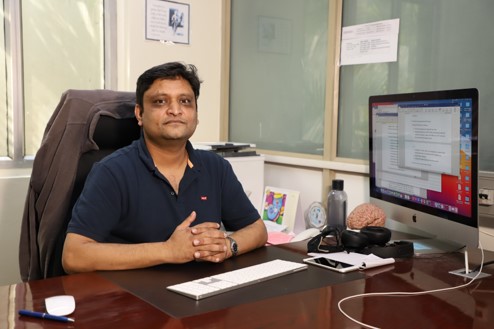
Nishant Singhal, Ph.D.
Stem Cell and Neurobiology labnsinghal@nccs.res.in
Research Areas
Neuroscience, Stem Cells and Regeneration
Education and Experience
Education
Ph.D.: Adolf Butenandt Institute, Ludwig Maximilian University, Munich, Germany, 2005
Experience
Scientist E: National Centre for Cell Science, July,2023 - Present
Scientist D: National Centre for Cell Science, July,2017- June,2023
Assistant Project Scientist: University of California, San Diego, California, USA, 2012 -2017
Postdoctoral fellow: Max Planck Institute for Molecular Biomedicine, Muenster, Germany, 2005- 2012
Research
Finding treatments for more than 700 neurological disorders, including neurodevelopmental disorders like Down Syndrome, Autism, Neurodegenerative disorders like Alzheimer’s, Huntington and Neuropsychiatric disorders like Schizophrenia, bipolar disorder is the most significant challenge for the current scientific community.
Over decades exciting research has been carried out in these areas using various model systems. However, these models have posed several limitations in finding treatments for these neurological disorders due to differences with humans at the cellular and molecular level.
The invention of induced pluripotent stem cells (iPSCs) has provided an opportunity to model neurological disorders in a dish. It allows us to understand the cellular and molecular mechanism and develop drug screening strategies to identify treatments for these neurological disorders.
Currently, our lab focuses on Down syndrome caused by the trisomy of chromosome 21. Individuals with Down syndrome suffer from more than 80 health-related conditions, including intellectual disability. By the 4th decade of age, almost 100% of individuals with Down syndrome develop Alzheimer’s pathology. We are using human iPSCs technology to understand cellular and molecular mechanisms of Down Syndrome related neurological disorders and find treatment for improving the quality of life of individuals with Down syndrome.
Publications and Patents
| Dhat, R., Mongad, D., Raji, S., Arkat, S., Mahapatra, N.R., Singhal, N., et al. (2023). Epigenetic modifier alpha-ketoglutarate modulates aberrant gene body methylation and hydroxymethylation marks in diabetic heart. Epigenetics Chromatin 16(1), 12. doi: 10.1186/s13072-023-00489-4 |
| Ghosh, S., Jackson-Cook, C., Singhal, N., and Hui, S.P. (2023). Editorial: Down syndrome: Genetic and epigenetic influences on this multi-faceted condition. Front Genet 14, 1163133. doi: 10.3389/fgene.2023.1163133. |
|
Nehra, S., Sharma, V., Umrani, M., and Singhal, N. (2023). Generation of integration-free Down syndrome and isogenic euploid human induced pluripotent stem cells. Stem Cell Res 67, 103041. doi: 10.1016/j.scr.2023.103041. |
|
Sharma, V., Nehra, S., Do, L.H., Ghosh, A., Deshpande, A.J., and Singhal, N. (2022). Biphasic cell cycle defect causes impaired neurogenesis in down syndrome. Frontiers in Genetics 13. 10.3389/fgene.2022.1007519. |
|
Sharma, V., Nehra, S., and Singhal, N. (2022). Generation of AAVS1-EGFP reporter cell lines from an isogenic pair of trisomy 21 and euploid human iPSCs. Stem cell research 64, 102890. 10.1016/j.scr.2022.102890. |
|
Nehra, S., Sharma, V., Singh, M., Singhal, P. & Singhal, N. Generation of integration free hiPSCs clones, NSi001-A, NSi001-B, and NSi001-C from peripheral blood mononuclear cells of an individual with down syndrome having Robertsonian translocation. Stem cell research 61, 102771, doi:10.1016/j.scr.2022.102771 (2022). |
|
Wagner, G* and Singhal, N*. et al. Brg1 chromatin remodeling ATPase balances germ layer patterning by amplifying the transcriptional burst at midblastula transition. PLoS genetics 13, e1006757, doi:10.1371/journal.pgen.1006757 (2017). * Equal First author |
|
Singhal, N.*, Bravo, MJA., Sinn M., Zaehres, H. (2016) BAF complex enhances reprogramming of adult human fibroblasts. Journal of Stem Cell Research and Therapy 6: 336. doi:10.4172/2157-7633.1000336 * Corresponding author |
|
Belichenko, PV.,*# Madani, R.,# Rey-Bellet, L., Pihlgren,M., Becker, A., Plassard, A., Vuillermot, S., Giriens, V., Nosheny, RL., Kleschevnikov, AM., Valletta, JS., Bengtsson, S., Linke, GR., Maloney, MT., Hickman, DT., Reis, P., Granet, A., Mlaki, D., Lopez-Deber, MP., Do, L., Singhal, N., Masliah, E Pearn, ML., Pfeifer, A., Muhs, A., * Mobley, WC., (2016) An anti-β-Amyloid Vaccine for Treating Cognitive Deficits in Down Syndrome. PLOS ONE 11 (3) e0152471 |
|
Do, L., Mobley, WC., Singhal, N*. (2015) Questioned validity of GEDDs in Down Syndrome. F1000Research 2015, 4:269 (doi: 10.12688/f1000research.6735.1) * Corresponding author |
|
Singhal, N.*, Esch, D., Stehling, M., Schöler, HR. (2014) BRG1 is required to maintain pluripotency of murine embryonic stem cells. Bioresearch Open Access, 3, 1-8. * Corresponding author
|
|
Wu, W., Han, D., Gong, Y., Sebastiano, V., Gentile, L., Singhal, N., Adachi, K., Fischedick, G., Ortmeier, C., Sinn, M., Radstaak, M., Tomilin, A., Schöler, HR* (2013) Establishment of Totipotency does not depend on Oct4. Nature Cell Biology. 15, 1089-1097.
|
|
Sharma, A.D*., Narain, N., Handel, E.M., Iken, M., Singhal, N., Cathomen, T., Manns, M.P., Schöler, HR., Ott, M., and Cantz, T. (2011). MicroRNA-221 regulates FAS-induced fulminant liver failure. Hepatology 53, 1651-1661. |
|
Singhal, N., Graumann, J, Wu, G., Bravo, MJA., Han, DW., Greber, B., Gentile, L., Mann, M., and Schöler, HR*. (2010). Chromatin Remodeling Components of the BAF Complex Facilitate Reprogramming. Cell 141, 943-955
|
|
Zaehres, H*., Do, J.T., Singhal, N., Tapia, N., Han, D.W., and Schöler, H. (2008). Genetic modulation of self-renewal factors for induced reprogramming of somatic cells. Cell Res 18. |
|
Rupp, R. A. W*., Singhal, N., and Veenstra, G. J. C. (2002). When the embryonic genome flexes its muscles – chromatin and myogenic specification. European Journal of Biochemistry 269, 2294-2299. (Citations:22) |
Current/Past Lab Members
Ph.D. Student
-
Sunita Nehra (Since November 2018)
-
Vishi Sharma (Since November 2018)
-
Harish (Since March 2023)
Alumni
-
Princy Kakani (Project Assistant and Summer trainee)
-
Abishek Soni (Summer trainee)
-
Navia John ( Summer trainee)
-
Palak Sangal (Summer trainee)
Back
Last updated On : 04 January 2024 09:24


